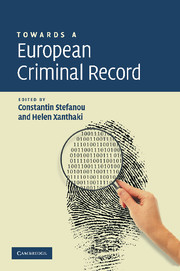Book contents
- Frontmatter
- Contents
- List of contributors
- Preface and acknowledgements
- 1 Introduction: How did the idea of a European Criminal Record come about?
- PART I
- PART II
- 5 The European Criminal Record in Austria
- 6 The European Criminal Record in the Czech Republic
- 7 The European Criminal Record in Germany
- 8 The European Criminal Record in Greece
- 9 The European Criminal Record in Hungary
- 10 The European Criminal Record in Ireland
- 11 The European Criminal Record in the Netherlands
- 12 The European Criminal Record in Slovenia
- 13 The European Criminal Record in Slovakia
- 14 The European Criminal Record in Spain
- 15 The European Criminal Record in England and Wales
- PART III
- 19 Conclusions
- Index
15 - The European Criminal Record in England and Wales
Published online by Cambridge University Press: 13 July 2009
- Frontmatter
- Contents
- List of contributors
- Preface and acknowledgements
- 1 Introduction: How did the idea of a European Criminal Record come about?
- PART I
- PART II
- 5 The European Criminal Record in Austria
- 6 The European Criminal Record in the Czech Republic
- 7 The European Criminal Record in Germany
- 8 The European Criminal Record in Greece
- 9 The European Criminal Record in Hungary
- 10 The European Criminal Record in Ireland
- 11 The European Criminal Record in the Netherlands
- 12 The European Criminal Record in Slovenia
- 13 The European Criminal Record in Slovakia
- 14 The European Criminal Record in Spain
- 15 The European Criminal Record in England and Wales
- PART III
- 19 Conclusions
- Index
Summary
Introduction
The research that underpins this chapter was originally conducted for two European Commission funded projects to provide baseline data for all EU jurisdictions and is thus broadly descriptive of law and policy. The research sought views on the proposals for a European Criminal Record (ECR) from key agencies and organisations. This has been supplemented by consideration of the House of Commons European Scrutiny Committee's first, twenty-first and twenty-eighth reports and the minutes of evidence from the House of Lords Select Committee on European Union and its twenty-third report, all of which examined this issue. This chapter considers the existing legal framework for criminal records and any amendments that would be required to accommodate some of the proposals made in respect of the ECR. It addresses the content of domestic criminal records and policy views on the appropriate content of an ECR. It considers those categories of people who are permitted to access domestic criminal records and the policy debates in respect of the ECR, as well as the use to which criminal records may be put both domestically and across Europe. Finally it evaluates that debate on the proposed ECR from the England and Wales' perspective.
The existing legal framework
In England and Wales criminal convictions are recorded at both a national and local level.
- Type
- Chapter
- Information
- Towards a European Criminal Record , pp. 291 - 308Publisher: Cambridge University PressPrint publication year: 2008



